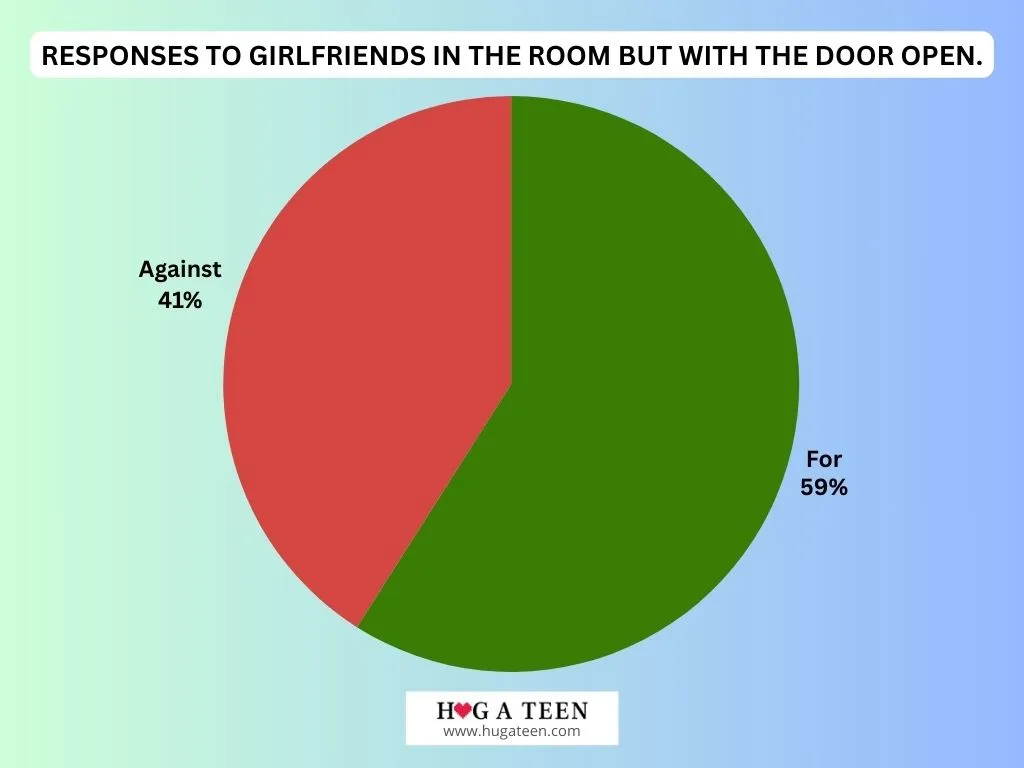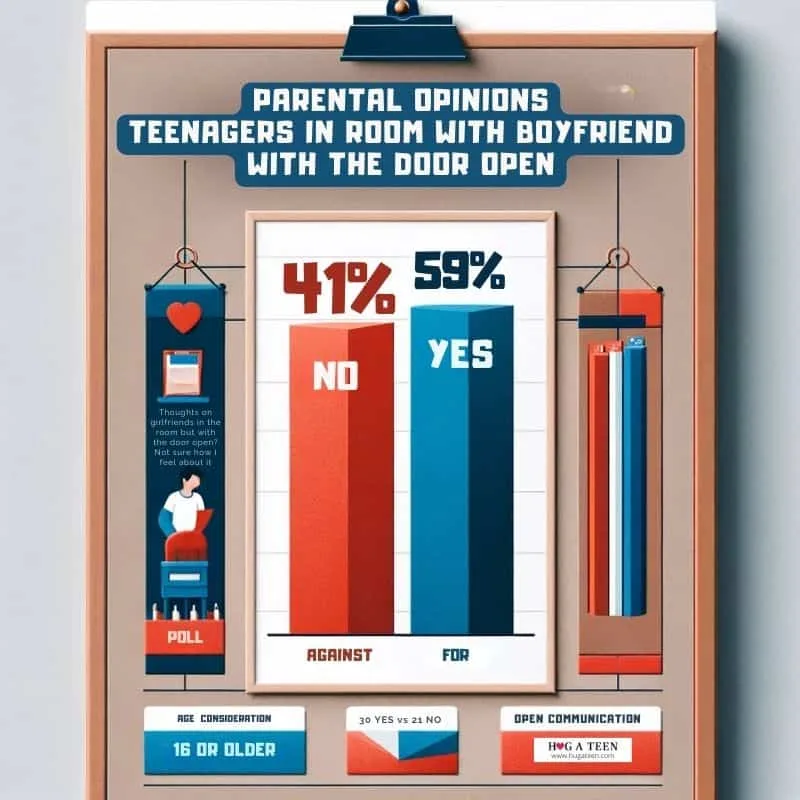The question of how much privacy to afford teenagers, especially when it involves their relationships, often sparks lively debates.
Recently, we conducted a poll among parents, delving into their thoughts on teen privacy and a specific yet common scenario: allowing their teenagers to have boyfriends or girlfriends in their rooms with the door open.
This seemingly straightforward question yielded a diverse set of opinions, reflecting today’s varied parenting styles and values.
The results of our poll are not just numbers; they symbolize the varying attitudes toward teen privacy, trust, and boundaries within a family setting.
In this article, we dissect these responses, aiming to provide a comprehensive overview of contemporary parental attitudes.
Whether you’re a parent grappling with this decision, or simply interested in the dynamics of modern parenting, our findings offer valuable insights into how families are navigating these intimate and often tricky aspects of raising teenagers.
Poll Results: Teen Privacy and Open-Door Policy

The findings from our survey reveal a significant divide among parents on the issue of teenagers having their partners in their rooms with the door open.
With more than half of the respondents (30 out of 51) voting ‘For – Yes’, it’s clear that many parents (59%) are leaning towards more open and trusting relationships with their teenagers, emphasizing respect for their privacy and autonomy.
On the other hand, the substantial 41% (21 out of 51) who voted ‘Against – No’ indicates a strong inclination towards more traditional views on boundaries and supervision in teenage relationships.
This divergence not only underscores the complexity of parenting decisions in the modern context but also highlights how individual values and experiences shape parental attitudes toward teen privacy and relationship boundaries.
Teen Privacy and Open-Door Policies: Parental Opinions

Here’s a summary of the feedback from parents on whether they would allow their teenagers to be in their rooms with their boyfriends or girlfriends, with the door open:
1. Location-Dependent Approval
Some parents are comfortable with this arrangement, provided the bedroom is in a common area, such as the first floor, where supervision is easier. The visibility of the room plays a crucial role in their decision.
“We can see into his bedroom when the door is open since his bedroom is on the first floor of our house right next to the living room and kitchen. If the bedroom were upstairs, I might not allow it.”
Kate C.
2. Open Door Policy with Conditions
A common response was allowing it with the door open, often combined with occasional check-ins. This approach is seen as a compromise, offering teens some privacy while still under parental oversight.
“It has never been an issue with any of my three sons, I just check randomly.”
Mary F.
3. Age and Maturity Consideration
Several parents base their decision on the age and maturity of their teens. Older teenagers, especially those around 16 or older, are often granted more privacy rights, reflecting their growing independence.
4. Emphasis on Trust and Communication
A notable group of parents advocate for trust and open communication with their teens about relationships and safe practices. They believe in educating their teens and respecting their privacy as part of their development.
“It depends on your son’s age and the type of relationship you have with him. Make sure you talk openly about sexual health and contraception with him. Let him know how easy it is to get pregnant or contract an STD.”
Linda S.
5. Strict Rules Against Privacy
On the other end of the spectrum, some parents are strictly against the idea, preferring interactions in public areas of the house. They believe that bedrooms should be off-limits to ensure appropriate behavior.
“Nope! Not in my house I’m not comfortable with that.”
Karen P.
6. Diverse Parenting Styles
The responses highlight a wide range of parenting styles, from more liberal to conservative. Some parents trust their children’s judgment and feel comfortable with closed doors, while others maintain stricter boundaries to prevent any possibility of sexual activity.
7. Respect for Partner’s Family Rules
Some parents mentioned that their decision is influenced by the rules of their child’s partner’s parents, suggesting a respect for mutual standards and consistency.
8. Safety and Supervision Concerns
For many, the decision is influenced by a desire to keep their teens safe. This includes parents who would rather have their teens at home under their supervision than potentially seeking privacy elsewhere.
“While I’m happy for them to share a bed at my house, her parents would like him to sleep in the spare room. They are adults, and I’d rather have relations in private rather than snatched moments elsewhere. However, underage is a no-go.”
Odette M.
In conclusion, parents’ opinions on this matter vary greatly, influenced by factors like their household setup, their values, the age and maturity of their teenager, and their approach to parenting and communication. There is no one-size-fits-all answer, and each family often finds a balance that works best for them.
Why Do Teens Need Privacy
Some parents are totally not on board with letting their teens have friends over in their bedrooms, even if the door’s left open. They might be wondering, “What’s the big deal about privacy for teens, anyway?”
However, there are several key reasons why teenagers need to have some privacy from their parents. Let’s break it down with some real-life stuff:
- Becoming Their Own Boss: Think of privacy like training wheels for adulthood. Teens need their own space to make choices and figure things out – like deciding whether to do homework or watch a movie. It’s all about learning to be independent.
- Who Am I, Really?: Remember being a teen and trying to figure out your favorite music, fashion, or what you stood for? That’s identity formation. Teens need alone time to dive into these personal explorations without someone always watching over their shoulder.
- Riding the Emotional Rollercoaster: Teens and mood swings go hand in hand, right? Having a private space is like their personal chill-out zone to deal with all those highs and lows.
- Trust Is a Two-Way Street: When we give teens a bit of privacy, it’s like saying, “Hey, I trust you.” And that builds a stronger, more respectful relationship.
- Friends and First Crushes: Just like we had our heart-to-heart talks and giggles with friends away from our parents, teens need their space to chat, hang out, and yes, maybe even talk about their crushes.
- Brainpower Boost: Ever notice how teens get super into stuff like gaming, writing, or even just daydreaming? That’s them growing their brain muscles. Private time lets them dive deep into these activities without interruptions.
- Online Life: In today’s world, teens are online a lot. They need to know how to keep things private on the internet too, for their own safety.
So, giving teens privacy isn’t just about giving them space; it’s about helping them grow into awesome adults
Final Thoughts On Teen Privacy
The debate on teen privacy and open-door policies is not just about a simple household rule—it’s a reflection of the broader challenges in parenting during the transitional teenage years.
Our survey highlighted that while a majority of parents lean towards a more liberal approach, valuing open communication and trust, a significant number still adhere to traditional views, emphasizing supervision and clear boundaries.
This diversity in opinions underlines the fact that there is no one-size-fits-all approach to parenting. Each family must navigate these waters based on their values, the individual needs of their teen, and the dynamics of their household.
What remains constant, however, is the universal goal of all parents: to guide their children toward becoming responsible, respectful, and well-adjusted adults.
This journey, though challenging, is enriched by understanding and respecting the evolving perspectives on teen privacy and open-door policies.
